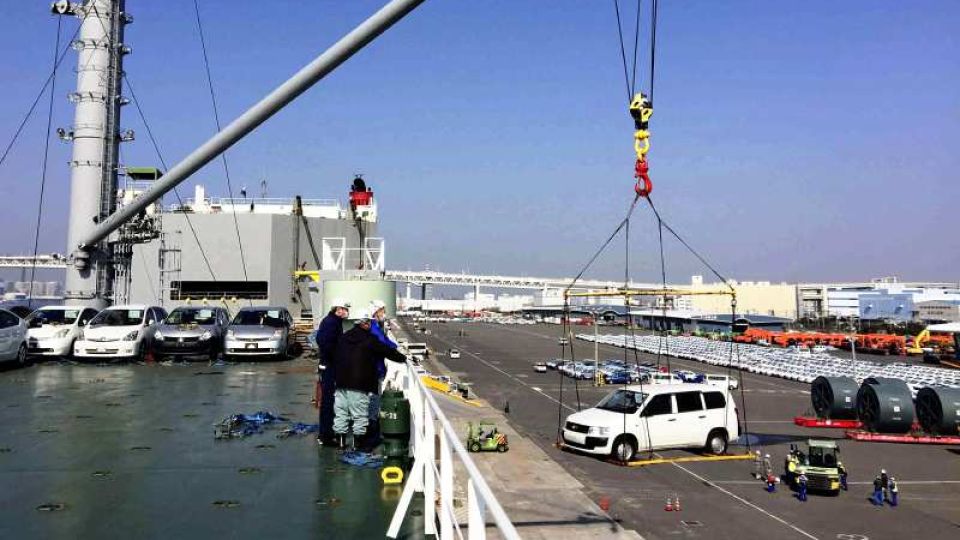April 21, 2022
TOKYO – Russia’s invasion of Ukraine is negatively impacting Japan’s used car market.
A shortage of semiconductors has slowed the supply of new cars amid the novel coronavirus pandemic, which had driven the prices of used cars higher. But the trend turned around after Moscow launched an attack on its neighbor. Since the start of the invasion, shipments to Russia — traditionally the largest importer of used cars from Japan — drastically decreased, causing an ongoing decline in the prices of secondhand vehicles.
90% decrease
The average March auction price for a used car was ¥911,000, according to USS Co., a major used-car auction firm. This figure is lower than the ¥1.006 million — the highest-ever average price — recorded in February.
Many used car exporters procure their products through auctions. It is assumed that the recent price fall is due to a decrease in exports to Russia, causing supply to exceed demand.
Prior to the conflict in Ukraine, Yamagin Corp., a Tokyo-based company that exports used cars, had been exporting 200 to 300 cars to Russia every month. In March, however, the exports plummeted by about 90%.
Economic sanctions on Russia imposed by Japan, the United States and European countries caused the ruble to dive in value at one point and it became difficult for Russian car dealers to buy Japanese vehicles.
Japanese cars are known as being hard-wearing and for retaining their value over time — features that are highly valued in Russia.
Toyota Motor Corp.’s RAV4 sport-utility model is one of best-selling Japanese cars in Russia. Nissan Motor Co.’s Leaf electric vehicle is also popular.
Yamagin President Hiroshi Sato lamented the situation, saying: “In Vladivostok, most cars are Japanese. If the current situation continues for a year, the whole industry will face hardship.”
Distribution services suspended
Maritime shipping company Eastern Car Liner Ltd. in February suspended cargo ship transportation services connecting such Japanese ports as Nagoya and Kisarazu in Chiba Prefecture with Russia. Until then, the company had been shipping 3,000 to 4,000 used cars each month to the country. Presently, the company does not know when shipments will resume.
Some companies based in locations that face the Sea of Japan have continued to ship goods to Russia. An official of one such company said, “Some firms gave up supplying Russia and switched their export destinations to other regions.”
Future restrictions
Until recently, Japan’s domestic used-car market had been doing brisk business. Due to the worldwide shortage of semiconductors, consumers had to wait several months after placing an order for a new car, causing an uptick in the number of people turning to the used car market.
As fewer people were replacing their old cars with new models, the number of used cars in circulation began to decrease — a factor that has contributed to the increase in secondhand car prices since spring 2020.
However, Russia’s invasion of Ukraine poured cold water on the heated used car market.
According to the Japan Used Motor Vehicle Exporters Association, about 160,000 secondhand cars were exported to Russia in 2021, accounting for 13% of the total and making the country the largest export destination. This number represents an increase of more than 30,000 from the previous year. Russia’s zeal for used Japanese cars outstripped demand from the United Arab Emirates and New Zealand.
Some in the industry are concerned about how the government’s restrictions on exports to Russia will develop. The Economy, Trade and Industry Ministry prohibits exports of diesel engines and luxury cars costing over ¥6 million. If the range of such restrictions were to be expanded, it may further impact used car exports.
Automakers have made efforts to stabilize the secondhand market. If prices are high, people often want to sell their current cars earlier than usual to help finance new ones.
If prices for used cars fluctuate due to a shortage of semiconductors or geopolitical risks, it will be difficult for automakers to formulate business strategies.

